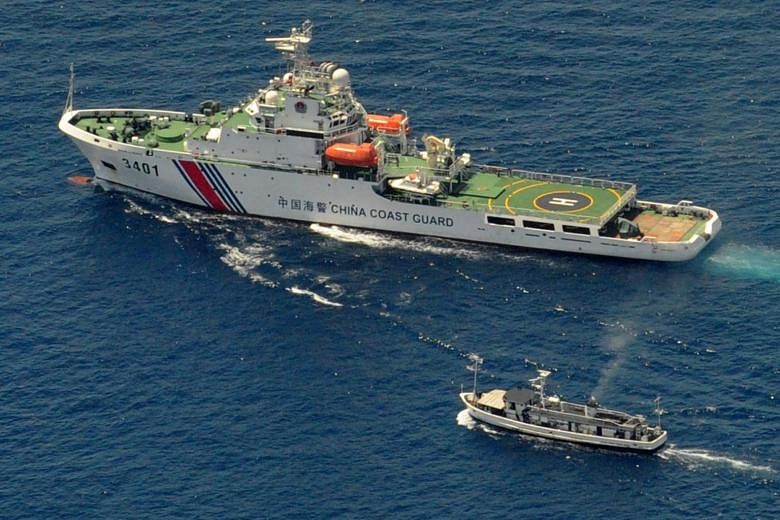WASHINGTON/BEIJING - A report by the US State Department detailing the case against Beijing’s extensive territorial claims in the South China Sea has rejected them as being “plainly inconsistent with international law".
“These claims, especially considering their expansive geographic and substantive scope, gravely undermine the rule of law in the oceans and numerous universally recognised provisions of international law reflected in the convention,” the 47-page report concluded.
That convention is the 1982 UN Convention on the Law of the Sea (Unclos).
The report released on Wednesday (Jan 12) by the State Department’s Office of Ocean and Polar Affairs was seen as the most detailed yet by Washington on the issue.
Not surprisingly, it drew an immediate riposte from China, with a foreign ministry spokesman saying the report “distorts international law, misleads the public, sows discord and disrupts the regional situation".
The spokesman, Mr Wang Wenbin, said the US “considers itself a judge of the convention” even though it – unlike China – has not ratified Unclos.
Beijing would work with Asean countries towards “peace and stability in the South China Sea and promote regional prosperity and development", he said.
China’s expansive claims in the South China Sea are disputed by several countries in South-east Asia, including Brunei, Malaysia, the Philippines and Vietnam, all of which, analysts said, would likely welcome the report.
Maritime security expert Collin Koh from the S. Rajaratnam School of International Studies in Singapore, said: “Asean countries will look at this report with great interest.
“The materials enshrined in the report will be very useful in helping to further strengthen the position of Asean parties in a negotiation with China.”
The State Department report is the latest move in a gradual shift from the former Trump administration’s often military-focused approach to confronting China in the South China Sea, to a more “political and legal” approach, he said.
International relations expert Shi Yinhong of Renmin University in Beijing, also said the study would likely encourage South-east Asian countries that dispute Beijing’s claims to stand up to China.
“With the US holding such a tough position, countries like Vietnam, Malaysia, Indonesia will feel a sense of reassurance,” said Professor Shi. Indonesia is not a claimant state in the South China Sea, but is in an ongoing dispute with China over control of waters around the Natuna Islands.
In Washington, Dr Patrick Cronin, Asia-Pacific Security Chair at the Hudson Institute, told The Straits Times the report explained clearly major ways in which China had “overreached on its maritime claims in the South China Sea in a manner Asean members should be able to agree".
“Perhaps the most important thing is the State Department’s use of international law to buttress diplomacy,” Dr Cronin said. “This study may be the important legal foundation for some muscular diplomacy.”
The report noted that since 2014, China has continued to assert claims to a wide swathe of the South China Sea as well as to what it has termed “internal waters” and “outlying archipelagos” - all of which are “inconsistent with international law” as reflected in Unclos.
“This includes any claim to sovereignty over entirely submerged features like James Shoal, Vanguard Bank, and Macclesfield Bank,” it said.
James Shoal is about 45 nautical miles off Sarawak. Vanguard Bank, also entirely submerged, is within Vietnam’s exclusive economic zone and occupied by Hanoi. Macclesfield Bank is also claimed by Vietnam.
The report also rejected China’s claims to sovereignty over features exposed at low tide elevations, such as Mischief Reef and Second Thomas Shoal, which fall “entirely beyond a lawful territorial sea entitlement and which are not subject to appropriation under international law".
China’s “baselines enclosing Xisha Qundao (Paracel Islands) and its asserted intention to establish baselines around other 'island groups' in the South China Sea are also inconsistent with international law” it said.
“None of the four islands or island groups that the PRC (People’s Republic of China) considers to comprise 'Nanhai Zhudao' meet the geographic criteria for straight baselines reflected in Article 7 of the convention.”
The report also rejected China’s argument about a separate body of customary international law, outside of the convention, that justified its straight baseline claims in the South China Sea.

